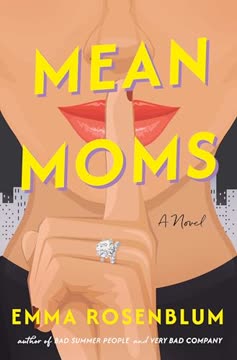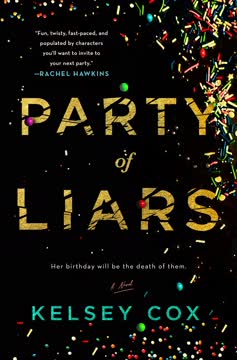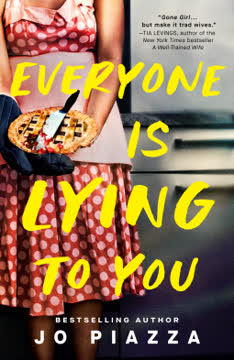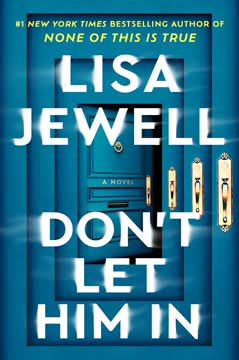Plot Summary
Prologue: Police at the Door
Nora Somerset stands in the Florida heat as police cars fill her driveway, their presence a harbinger of disaster. The lead detective, Ardell, locks eyes with her, silently accusing. Nora's mind races through regrets and missed warnings, haunted by the memory of her husband Will's face. As her best friend Este calls her inside, Nora knows the police are here for her, and that her carefully constructed life is about to be dismantled. The sense of dread is palpable, and Nora is left suspended between the past and the catastrophe now unfolding.
Party, Stains, and Secrets
Nora hosts a lavish birthday party for her older, successful husband, Will, hoping to finally be accepted by his elite Winter Park circle. Instead, she's an outsider, judged as the young second wife. A spilled glass of red wine ruins her white dress, symbolizing her precarious place in this world. Her friend Este tries to comfort her, but the party's gossip and the wives' coldness leave Nora feeling exposed. The night is a performance, and Nora's desperation to belong is met with disaster and humiliation.
Outsider Among the Elite
Nora changes into a new dress and observes Will's heated argument with his law partner, Fritz, a scion of Winter Park royalty. The party is a showcase of old money, power, and subtle cruelty. Nora is both arm candy and a threat to the established order, especially to Will's ex-wife Constance and her ally Gianna. Will's affection is real, but the social dynamics are brutal. Nora's longing for acceptance is met with suspicion, and the party's success is overshadowed by her sense of alienation.
Night's Intimacies, Sudden Absence
After the party, Nora and Will share a rare moment of intimacy and playfulness, but it's interrupted by a call from Will's daughter, Mia, about a forgotten sweatshirt. Will leaves to retrieve it, promising to return. Nora waits for him in bed, but falls asleep alone. The next morning, Will is gone. The absence is at first mundane—he's a workaholic, after all—but soon becomes ominous. Nora's unease grows as she realizes this is not just another late night at the office.
The Vanishing Husband
Nora wakes to find Will still gone. She tries to rationalize his absence—work, stress, old habits—but as hours pass, worry turns to fear. Este tries to distract her, but Nora's calls and texts go unanswered. Will's car is still at home, and his phone can't be located. The routines of their privileged life—yoga, brunch, errands—are hollowed out by the growing sense that something is terribly wrong. Nora's world, once defined by comfort and security, is now ruled by uncertainty.
Searching, Suspicions, and Silence
Nora and Este try to track Will down, calling hotels and his assistant, but hit dead ends. The police are not yet involved, and Nora is reluctant to make a scene. The social order of Winter Park is maintained by secrecy and appearances, and Nora fears becoming gossip fodder. As the hours drag on, her anxiety mounts. The veneer of privilege offers no protection from the terror of not knowing, and Nora is left to confront the possibility that Will's disappearance is not innocent.
Thirty-Six Hours Missing
Fritz, Will's law partner, arrives looking for Will, shocked that Nora hasn't called the police. The reality of Will's absence becomes undeniable. Detective Ardell is summoned, and the missing person report is filed. The investigation begins, but the focus is as much on optics and reputation as on finding Will. Nora is caught between Fritz's accusations, Este's skepticism, and her own guilt. The house is searched, the dock examined, but there are no answers—only the chilling sense that something terrible has happened.
The Investigation Begins
Detective Ardell questions Nora, probing for inconsistencies. The lack of security cameras, the absence of an alibi, and the social dynamics all cast suspicion on her. The Winter Park gossip mill churns, and Nora becomes the subject of speculation. Constance, Will's ex-wife, is quick to blame Nora, and the press begins to circle. Nora's isolation deepens as she realizes she is both a victim and a suspect, trapped in a world where appearances matter more than truth.
Before: Nora's Old Life
Before Will, Nora worked menial jobs, scraping by and dreaming of a better life. Her mother's string of failed relationships taught her to be self-reliant and wary of love. Teaching swim lessons at the country club, Nora meets Mia, Will's daughter, and through a twist of fate, Will himself. Their connection is immediate, and Will's kindness and stability are a revelation. Nora is drawn into his world, but her insecurities and outsider status never fully disappear.
The First Date
Will asks Nora out, and their first date is a whirlwind of chemistry, humor, and vulnerability. Will is older, successful, and emotionally available in a way Nora has never known. Their relationship moves quickly, fueled by mutual need and the allure of a new beginning. Nora is swept off her feet, but the age gap and social differences are ever-present. The romance is intoxicating, but the seeds of future conflict are sown in their differences.
The Ghosting Grows
As their marriage settles into routine, Will's workaholism and emotional distance become more pronounced. Nora is left alone, filling her days with Este and Beau, trying to find purpose. The cracks in their relationship widen, and Nora's sense of belonging is always conditional. Will's disappearances become more frequent, and Nora's attempts to reach him are met with silence. The loneliness is suffocating, and Nora begins to question her choices.
The Call That Wasn't
The night Will vanished, Nora believed he left to help Mia, but it's revealed that Mia never called. The call came from someone else, and the lie unravels Nora's last sense of certainty. The police focus on this discrepancy, and Nora's credibility is undermined. The search for Will becomes a search for the truth about that call, and Nora is forced to confront the possibility that someone close to her is hiding something.
The Gossip Mill
The press descends, painting Nora as the prime suspect. Every move she makes is scrutinized, from yoga classes to Botox appointments. Old friends and enemies alike turn on her, and the Winter Park wives relish her downfall. Nora's isolation is complete, and the pressure mounts as the investigation stalls. The line between victim and villain blurs, and Nora is left to fight for her reputation as well as her innocence.
Before: Becoming a Wife
Nora and Will's whirlwind romance leads to marriage, but the transition is fraught. The wedding is a social event, and Nora is thrust into a world of parties, rivalries, and unspoken rules. Constance and Gianna work to undermine her, and even Will's friends are wary. Nora's attempts to fit in are met with resistance, and the power dynamics of Winter Park are laid bare. The marriage is both a dream and a battleground.
The Cracks in Paradise
As Will's work pressures mount, the marriage suffers. Fights become more frequent, and Nora's loneliness grows. Will's law partner Fritz is increasingly erratic, and financial pressures surface. Nora's friendship with Marcus, a local chef, becomes a source of comfort—and suspicion. The lines between loyalty and betrayal blur, and Nora is forced to confront the reality that her marriage is not what it seemed.
The Body is Found
After days of searching, Will's body is found in the lake, bearing signs of blunt force trauma. The case shifts from missing person to homicide, and Nora's world collapses. The press intensifies, and the police focus on her as the prime suspect. Friends and neighbors offer hollow condolences, but suspicion lingers. Nora is left to grieve in public, her every move dissected by strangers and enemies alike.
The Widow on Trial
Nora is brought in for questioning, her house searched, and her alibi picked apart. The discovery of the murder weapon—a hammer—under her dock further implicates her. The press seizes on every detail, and Nora's friendship with Marcus is twisted into motive. Even Este, her closest ally, is forced to ask hard questions. Nora's desperation grows as she realizes she must solve the case herself to clear her name.
Before: The Other Man
In flashbacks, Nora's friendship with Marcus is explored. He is kind, attentive, and everything Will is not. After a particularly bad fight with Will, Nora spends the night at Marcus's house—platonically, but the emotional intimacy is undeniable. The boundaries blur, and Nora is wracked with guilt. The press and police seize on this relationship as evidence of motive, and Nora's world narrows further.
The Press and the Past
Nora becomes a pariah, hounded by reporters and abandoned by former friends. The Winter Park wives revel in her disgrace, and even Este is forced to keep her distance. Nora's only hope is to find the real killer, and she begins her own investigation. Clues about Will's business partner Fritz, financial irregularities, and a mysterious private investigator named Dean Morrison begin to surface. Nora's resolve hardens—she will not be destroyed by lies.
The Truth About Fritz
Nora uncovers evidence that Fritz was embezzling from the law firm, forging signatures, and using Will's name to secure fraudulent loans. Will had hired Dean Morrison, a PI from his hometown, to investigate Fritz. Dean's suspicious death in a car accident is linked to the case. Nora confronts Fritz, who is desperate to protect his reputation and fortune. The web of lies tightens, and Nora realizes the stakes are higher than she imagined.
The Real Killer
With the help of Perry, Dean's friend, and Autumn, the party planner, Nora pieces together the truth. Gianna, Fritz's wife and Constance's ally, killed Will to protect her husband and their social standing. She lured Will to the dock, attacked him with a hammer, and staged the scene. Will, ever the lawyer, swallowed a gemstone from Gianna's ring as evidence. DNA and the missing stone finally tie Gianna to the crime. Nora confronts her in a dramatic showdown, and Gianna is arrested, her reign as queen of Winter Park ended.
Aftermath and Moving On
With Gianna in jail and Fritz exposed, Nora is exonerated. The press moves on, but the scars remain. Nora sells the house, says goodbye to Mia and Constance, and begins to rebuild her life. She reconnects with Este and Marcus, and enrolls in art school, finally pursuing her own dreams. The memory of Will lingers, but Nora is determined to find happiness on her own terms. The story ends with Nora, steady and hopeful, looking to the horizon as she leaves her old life behind.
Characters
Nora Somerset
Nora is the young, second wife of Will Somerset, thrust into the insular, judgmental world of Winter Park's elite. Haunted by a difficult childhood and a deep sense of not belonging, she is both vulnerable and resilient. Nora's marriage to Will offers security but also isolation, as she is never fully accepted by his friends or ex-wife. When Will disappears and is later found murdered, Nora becomes the prime suspect, forced to navigate suspicion, betrayal, and public scrutiny. Her psychological journey is one of self-doubt, grief, and ultimately empowerment, as she takes control of her own narrative and uncovers the truth.
Will Somerset
Will is a successful attorney, older than Nora, and the anchor of the Somerset-Hall law firm. He is both loving and distant, devoted to his work and haunted by past failures. Will's desire to protect Nora is genuine, but his inability to communicate and his entanglement in the toxic world of Winter Park contribute to his downfall. His murder is the catalyst for the novel's events, and his legacy is both a blessing and a burden for Nora. Will's psychological complexity lies in his need for control, his fear of failure, and his tragic inability to escape the consequences of his choices.
Este
Este is Nora's best friend and neighbor, a California transplant with a rebellious streak and a massive fortune. She is Nora's confidante, protector, and sometimes harsh critic. Este's irreverence and loyalty provide comic relief and emotional support, but she is also unafraid to challenge Nora's self-deceptions. Her own marriage to Beau is a model of partnership, highlighting the deficiencies in Nora's relationship with Will. Este's psychological role is to push Nora toward self-awareness and to stand by her when the world turns against her.
Fritz Hall
Fritz is Will's law partner and the scion of Winter Park royalty. Outwardly charming and successful, he is in fact reckless, egotistical, and financially corrupt. Fritz's embezzlement and betrayal set the stage for Will's murder, and his attempts to control Nora and the narrative are driven by fear and self-preservation. His relationship with Gianna is transactional, and his friendship with Will is ultimately destroyed by greed. Fritz's psychological arc is one of decline, as his entitlement and lack of accountability lead to his downfall.
Gianna Hall
Gianna is Fritz's wife and Constance's closest ally, the epitome of Winter Park's social elite. She is beautiful, icy, and fiercely protective of her status. Gianna's willingness to kill to protect her husband and their reputation reveals a deep-seated insecurity and capacity for violence. Her affair with Autumn and her manipulation of those around her underscore her moral bankruptcy. Gianna's psychological complexity lies in her need for control, her fear of losing power, and her ultimate unraveling when her secrets are exposed.
Constance
Constance is Will's ex-wife and Mia's mother, a formidable presence in Winter Park society. She resents Nora's intrusion into her old life and works to undermine her at every turn. Constance's grief over Will's death is complicated by jealousy and regret, but she ultimately finds common ground with Nora for Mia's sake. Her psychological journey is one of loss, adaptation, and reluctant acceptance, as she navigates the shifting power dynamics of her world.
Mia
Mia is Will and Constance's teenage daughter, caught between her parents' divorce and the social wars of Winter Park. She forms a tentative bond with Nora, who becomes a surrogate older sister or stepmother. Mia's struggles with adolescence, loyalty, and grief are central to the emotional stakes of the story. Her presence humanizes both Nora and Will, and her well-being becomes a touchstone for the adults' actions.
Marcus
Marcus is a talented chef and friend to Este and Beau, who becomes Nora's confidant and emotional support. Their relationship is fraught with unspoken attraction and the possibility of betrayal. Marcus represents an alternative to Nora's life with Will—one of authenticity, creativity, and acceptance. His kindness and integrity are a foil to the duplicity of Winter Park, but his involvement with Nora also makes him a target of suspicion. Marcus's psychological role is to challenge Nora's assumptions about love, loyalty, and self-worth.
Autumn
Autumn is the indispensable party planner for Winter Park's elite, privy to their secrets and scandals. She is both invisible and essential, navigating the treacherous waters of privilege with discretion. Autumn's affair with Fritz and her knowledge of the night of Will's murder make her a key witness. Her psychological conflict is between self-preservation and doing the right thing, and her eventual decision to come forward is a turning point in the case.
Perry
Perry is a friend of Dean Morrison, the private investigator Will hired. He is an outsider to Winter Park, untainted by its corruption and able to see the truth. Perry's dogged pursuit of evidence and his support for Nora are instrumental in solving the case. His grief for Dean and his sense of justice drive him to help Nora, and his presence is a reminder that decency can survive even in the most toxic environments.
Plot Devices
Dual Timelines and Flashbacks
The novel alternates between the present-day investigation and flashbacks to Nora's past, her courtship with Will, and the events leading up to his murder. This structure allows the reader to piece together the mystery alongside Nora, gradually revealing secrets, motives, and betrayals. The flashbacks provide emotional depth and context, showing how Nora's outsider status and longing for acceptance shape her actions. The dual timelines also serve to misdirect suspicion and build suspense, as key details are withheld until the climax.
Unreliable Narration and Misdirection
Nora's perspective is colored by her insecurities, trauma, and the manipulations of those around her. The narrative plays with the reader's expectations, casting doubt on Nora's innocence and the motives of every character. Red herrings abound—Marcus's friendship, Fritz's financial crimes, Constance's hostility—keeping the reader guessing. The use of gossip, media coverage, and social scrutiny amplifies the sense of paranoia and uncertainty, making the truth elusive until the final reveal.
Social Satire and Class Critique
The insular world of Winter Park is both setting and antagonist, its rules and hierarchies shaping every character's fate. The novel satirizes the obsession with appearances, the cruelty of social climbing, and the moral rot beneath the surface. Parties, clubs, and charity events are battlegrounds for status, and the wives' rivalries are as deadly as any crime. The plot uses these dynamics to explore themes of belonging, ambition, and the cost of conformity.
Symbolism and Foreshadowing
Key symbols—the ruined white dress, the missing sweatshirt, the gemstone, the hammer—foreshadow the novel's twists and the true nature of the characters. The recurring motif of water and the lake represents both beauty and danger, a place of escape and of death. The party, with its surface glamour and underlying malice, sets the stage for the unraveling of secrets. These devices create a sense of inevitability and tragedy, as the characters are pulled toward their fates.
Analysis
Happy Wife is a razor-sharp domestic thriller that dissects the dark heart of privilege, marriage, and female identity in a world obsessed with appearances. Through Nora's journey from outsider to accused to survivor, the novel explores the corrosive effects of wealth, the fragility of belonging, and the dangers of suppressing one's own needs for the sake of acceptance. The story is as much a critique of social hierarchies and gender roles as it is a murder mystery, using the insular world of Winter Park as a microcosm of broader societal dysfunction. The novel's structure—blending present-day suspense with emotionally rich flashbacks—invites readers to question not only who committed the crime, but why so many are complicit in maintaining the status quo. Ultimately, Happy Wife is a story of resilience and self-discovery, urging readers to look beyond the surface, challenge the narratives imposed upon them, and claim agency in the face of loss and betrayal. The lesson is clear: happiness cannot be found in conformity or the approval of others, but in the courage to confront the truth and forge one's own path.
Last updated:
Review Summary
Happy Wife received mixed reviews, with an average rating of 3.78 out of 5. Many readers found it an entertaining and fast-paced mystery thriller, praising its glitzy setting, twisty plot, and exploration of wealth and privilege. The protagonist, Nora, was generally well-received. However, some critics found the story predictable, with underdeveloped characters and a disappointing ending. While praised as a fun beach read, some felt it lacked depth and memorable elements. The audiobook narration was highly recommended by several reviewers.
Similar Books
Download PDF
Download EPUB
.epub digital book format is ideal for reading ebooks on phones, tablets, and e-readers.















